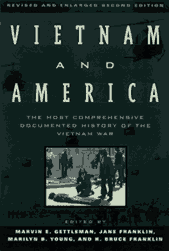|

|
Vietnam and America:
A
Documented History
Edited
by
Marvin
E. Gettleman
Jane M.
Franklin
Marilyn Young
H. Bruce Franklin
|
New York: Grove Press, 1985; 1988.
Revised and expanded edition, New York: Grove/Atlantic, 1995. ISBN
0-8021-3362-2
This complete history of the Vietnam War, as documented in essays by
leading experts and in original source material, presents selections from the
documented record, dispels distortions, and illuminates in depth both sides
of the history of America's encounter with Vietnam.
Table of Contents
- General Introduction
- PART I: THE VIETNAMESE STRUGGLE FOR
- Editors' Introduction
- Vietnam's Revolutionary Tradition, by Ngo Vinh Long
- First Appeal to the United States (June 18, 1919), by
Ho Chi Minh
- "The Path Which Led Me to Leninism" (1960),
by Ho Chi Minh
- Founding of the Doc-Lap Dong Minh Hoi (June 1941), by
Ho Chi Minh
- Imperial Abdication (August 1945), by Bao Dai
- Vietnam Declaration of Independence (September 2,
1945)
- PART II: THE WAR WITH FRANCE
- The Franco-Vietnamese War, 1945-1954: Origins of US
Involvement, by Ngo Vinh Long
- The French Return: Two State Department Views (April
1945)
- Vietnam's Second Appeal to the United States: Cable to
President Harry S. Truman (October 17, 1945), by Ho Chi Minh
- Franco-Vietnamese Agreement on the Independence of
Vietnam (March 1946)
- Sponsoring French Colonialism: The State Department
Decision (May 1950), by Secretary of State Dean Acheson
- Taking Up the White Man's Burden: Two American Views
(1954), by John Foster Dulles and Richard M. Nixon
- Vietnamese Victory: Dien Bien Phu, 1954, by Vo Nguyen
Giap
- PART III: GENEVA--THE PEACE SUBVERTED
- The Geneva Cease-Fire (July 20, 1954)
- Final Declaration of the Geneva Conference (July 21,
1954)
- Close of the Geneva Conference (July 21, 1954)
- Cold War Combat: Tactics After Geneva, by Edward G.
Lansdale
- Heroin and Politics in Saigon, by Alfred W. McCoy
- Elections and Reunification Denied (1955)
- "Vietnam's Democratic One-Man Rule," by
Wesley R. Fishel
- A Flawed Commitment: US Endorsement, with Conditions,
of Ngo Dinh Diem (1954), by President Dwight D. Eisenhower
- Genesis of US Support for the Regime of Ngo Dinh Diem,
by Robert Scheer
- PART IV: THE REVOLUTION AGAINST DIEM
- Behind the Miracle of South Vietnam, by Robert Scheer
- The Legal Underpinnings of Government Terror in South
Vietnam: Law 10/59
- Washington's Man in Saigon: American Commitment to
South Vietnam (1961), by Lyndon B. Johnson, Ngo Dinh Diem, John F.
Kennedy
- "No Other Road to Take": Origin of the
National Liberation Front in Ben Tre, by Mrs. Nguyen Thi Dinh
- Founding Program of the National Liberation Front of
South Vietnam
- "The Political and Military Line of Our
Party," by Vo Nguyen Giap
- US National Security Memorandum: Policy-Planning for
Counterinsurgency (1962), by McGeorge Bundy
- The Rise and Fall of "Counterinsurgency,"
1961-1964, by David G. Marr
- The Buddhist Crisis of 1963: The View from Washington
from The Pentagon Papers
- Diem Must Go: The US Embassy in Saigon Orchestrates a
Coup d'Etat (1963)
- PART V: THE AMERICANIZATION OF THE WAR
- The Blueprint for an Americanized War (1963-1964),
from The Pentagon Papers
- The Gulf of Tonkin "Incidents" and
Resolution (1964)
- Rationale for Escalation: The US Government
"White Paper" of 1965
- Refutation of the "White Paper," by I. F.
Stone
- "Defeat American Escalation": Report to the
National Assembly of the Democratic Republic of Vietnam (1965), by Ho
Chi Minh
- Negotiations? Hanoi's Four Points (April 8, 1965) and
Washington's Fourteen Points (January 7, 1966)
- US Crisis Managers Choose from Among Diminishing
Options (1965), by William C. Westmoreland, George Ball, William P.
Bundy, and Robert S. McNamara
- PART VI: THE MOVEMENT AGAINST THE WAR
- "We Won't Go," By the May 2nd Movement
- "Freedom Draft Card"
- Two Poems: "Afterthoughts on a Napalm-Drop on
Jungle Villages near Haiphong" and "Truth Blazes Even in
Little Children's Hearts," by Barbara Beidler and Huy Can
- "Declaration of Conscience Against the War in
Vietnam" (1965)
- "We Refuse - October 16" (1967)
- "A Call to Resist Illegitimate Authority"
(1967)
- "Declaration of Independence from the War in
Vietnam" (April 1967), by Martin Luther King, Jr.
- "Deserters' Manifesto" (1968)
- "Constraints of the Negro Civil Rights Movement
on American Military Effectiveness" (1970), by Commander George
L. Jackson
- "The Collapse of the Armed Forces" (1971),
by Colonel Robert D. Heinl, Jr.
- PART VII: THE DECISIVE YEAR: 1968
- "The Year of Decision - 1968," bBy William
C. Westmoreland
- "Remembering the Tet Offensive," by David
Hunt
- The Aftermath of Tet, from The Pentagon Papers
- "Peace in Vietnam and Southeast Asia":
Address to the Nation (March 31, 1968), by Lyndon Baines Johnson
- "What Happened at My Lai?" by Seymour M.
Hersh
- PART VIII: NIXON'S WAR AND THE AFTERMATH
- Negotiating Positions of 1969: The NLF's Ten Points
(May 8) and Nixon's Eight Points (May 14)
- "Vietnamization" (November 3, 1969), by
Richard M. Nixon
- Explaining the "Secret War" in Laos (March
6, 1970), by Richard M. Nixon
- Rationale for the Invasion of Cambodia (April 30,
1970), by Richard M. Nixon
- Vietnam Veterans Against the War: Testimony to the US
Senate Foreign Relations Committee (April 22, 1971), by John Kerry
- The Ecological Impact of the Air War, by Paul Feeny,
Jim Allaway
- Ending the War and Restoring Peace in Vietnam: The
Paris Peace Accords (January 27, 1973)
- US Promise of Postwar Reconstruction: Letter to DRV
Prime Minister Pham Van Dong (February 1, 1973), by Richard M. Nixon
- War Powers Resolution (1973)
- The "Great Spring Victory: An Account of the
Liberation of South Vietnam" (1975), by Van Tien Dung
- "'The Last Chapter'?" by H. Bruce Franklin
- Epilogue: "The Vietnam War in American
Memory," by Marilyn B. Young
- Appendices
- Chronology
- Glossary
- Select Bibliography
- Index
Top of page.
|